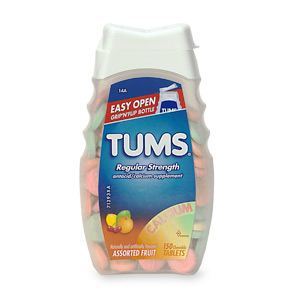Are you wondering if Tums can help your dog get over an upset stomach?
You aren’t alone. Many pets owners ask about using this popular antacid.
 You’ll be happy to hear that Tums, when dosed properly, is generally safe for dogs.
You’ll be happy to hear that Tums, when dosed properly, is generally safe for dogs.
The active ingredient (calcium carbonate) works equally well for canines. So, yes, you can alleviate tummy pains with these chalky chewable tablets.
You Can Give Your Dog Tums
Pepto-Bismol, which is preferred many vets, is also effective for the same purpose.
Tums Is Safe, But Does It Make Sense?
Consider that, often times, minor stomach issues resolve themselves. Giving your dog Tums may be unnecessary and, if so, should be avoided.
A true solution to your buddy’s gut problem may be a quality pet probiotic.
Your best course of action is to first have your dog evaluated to rule out what could be a serious stomach sickness.
In any case, Tums can provide temporary relief when discomfort lingers. Just be sure to give a dose based on their body weight.
Conservative With Calcium Carbonate
Tums dosing for dogs ranges from as little as 1,200mg all the way up to 10 grams. But 2 to 6 grams, over a 24 hour period, is a typical range.
Let’s break it down further:
- Small canines = Under 2 grams
- Medium dogs = 2 to 4 grams
- Big sized dogs = 4 to 6 grams
- Giant guy = 6 to 10 grams
Providing Tums proportionally means you will likely need to break up the tablets before giving them to your dog.
Caution: Very small breeds should only get a 1 gram or less dose. In rare cases, like for a tiny little guy, even 1 Tums tab can be too much.
Caution: Some Tums products contain xylitol which is a harmful ingredient for animals. Checking labels is essential!
Tums is Not a Calcium Supplement
It cannot be stressed enough:
Do not give your dog Tums as a supplement. Too much calcium may lead to pancreatitis among other complications.
Rest assured, a good canine chow will cover calcium requirements.
Get a pet-formulated calcium supplement if your dog really needs extra. Tums is inappropriate for this purpose.
Two Excellent Alternative Remedies
Feeding pureed pumpkin greatly helps and in a nutritious way! There’s a chance that Tums could constipate your dog, but this food will almost always normalize things.
Another approach is fasting followed by a reintroduction of mild foods such as boiled chicken and rice.
The need for Tums can typically be avoided assuming your dog is breaking down food efficiently. Feeding smaller portions can also improve matters.
Tums is not a lasting solution.
For Canines With Kidney Failure
There are many antacids including:
These are fairly similar to Tums.
Veterinarians utilize some of these brands, including for dogs suffering with kidney failure.
Antacids tend to reduce phosphate levels in the blood, which can sometimes be critical for keeping a precious pet alive. Obviously, a professional should advise you on this.
The Bottom Line
Tums, when conservatively dosed, will not harm your dog.
But, the thing is, stomach discomfort usually resolves itself. In other words, giving Tums or any other antacid may not actually be necessary.
Even if Tums works on your dog, it is not a long-term digestive solution; nor does it make sense as a calcium supplement.

Our 63 pound English Bully can clear the room from farting. We tried a Tums today with a little peanut butter on it. We will see (hear and smell) how it goes.
In the past, yogurt has not worked. We have also slowed his eating down, so he does not gulp his food. We’ve also tried placing a rubber toy in with his food and feeding him in two sessions, five minutes apart.
We had a Scotty with the same problem. We changed his dog food and it cleared up. If the Tums didn’t work, I’d try a different food.
How many tablets should I give my 43 pound dog? The other night we gave her a meat bone and I guess we shouldn’t do that again.
We have a 50 pound mixed Farrow Hound and something black. Anyway, he was throwing up almost every day. This was probably from eating lizard in the back yard. I started giving him two Tums tablets each night. He now very rarely gets sick, maybe once a month.
We have a Rottweiler that burps and breaks wind, sometimes to the point where he sounds like he has butt cheeks! He cries all night from gas. He gets so miserable. I have given him at the most 2 Tums, but I give him one then wait for at least 20 to 30 minutes to give him a second one. He does chew them up.
I also read a bit on Beano. It is a food mold that really is a non-medication natural product for people, but is very effective for gas. Our dog is 10 1/2 years old. I have given him 1/2 half of a Beano tablet and it seems to help him immensely. He does chew the Beano up as well.
I have looked at him and thought, he thinks he is dying. That is a lot of pain. I believe this to be safe but really am not positive. Our Rueben eats this as if he knows he must.
Just like his Glucosamine Chondroitin in the morning. That is expensive, but if he doesn’t take it for a couple of days he is limping. He even chews it up! What great companions. We are so lucky we have our pets.
We have a Saint Bernard that’s 8 years old and 135 pounds. He burps all the time. We give him one Prilosec a day but at night he wakes up and is very uncomfortable. He’s regurgitating with acid reflux.
He will eat Tums but I am worried all this stuff might not be good for him. Any help would be greatly appreciated. I’ve tried pumpkin but he will not eat it. He’s allergic to many things.
Tums and Prilosec or Pepcid aren’t comparable antacids. Tums or Rolaids are antacids which immediately neutralize acid in the stomach. They do not prevent formation of acid. If the dog is getting acid accumulation at night (or bile), an hour before bedtime try a quarter pill of plain (not flavored or sweetened) Rolaids or Tums.
Prilosac and Pepcid are proton pump inhibitors (PPIs) that take time to accumulate in the system and act on the stomach-brain communication to tell the stomach not to make acid. These are much stronger medications and Prilosec/Nexium are not intended for long term use (even though you may see advertisements that treat these as casual over the counter meds). They are not for long term use in people past 2 weeks without doctor supervision.
Pepcid is a milder version of Prilosec, also a PPI but with a different chemical. I had to give this to my 12 pound Peke-A-Pom and gave a quarter pill (2.5mg) a day, in the evening, with a little peanut butter. He took this for several weeks and it seemed to help. Like other heavier medications, if a pet has been on them for a while and you need to see if they can get off.
The dose should be cut back slowly (for PPIs) or you could get an acid surge from the brain trying to overcompensate on acid production. If pumpkin, apple cider vinegar in water, rice and chicken, or canned tripe work then avoid PPIs.
In thin or weak animals, too much Prilosec can pass the blood brain barrier and interfere with the central nervous system. If a pet behaves oddly between a day or two weeks after starting Prilosec, wean them off as soon as possible and switch back to Tums. Prilosec can cause fear, anxiety, neuropathy and odd neurological symptoms that might appear unrelated to GI symptoms.
Sometimes owners, even vets, falsely believe to think negatives symptoms are the result of another disease or condition when if fact it’s a medicine reaction or slow poisoning. Medicine can builds up in the bloodstream so use with caution.
Great info! Thank you Kay!
Our dog has a similar problem. We have found that a small amount of rice or lentils ( less than 4 ounces) before bedtime helps immensely. I have read that lentils are particularly good because the carbs neutralize and absorb stomach acid.
Pepcid isn’t a PPI. It’s an H2 antagonist.
My dog often would wake up in the middle of the night gagging and vomiting white liquid. My vet recommended giving her a small meal just before bed so that she would not have acid reflux or stomach upset. Since doing this around 10 PM every night, she has not vomited during the night in over 5 years. Previously, it was almost a nightly event.
I have a 10 year old Sheltie with chronic kidney disease which gives him upset stomach. The vet figures he has had it all his life. Unfortunately, Pepcid causes him to throw up. I started him on Tums, only 1/2 during day and broken up, and he is now eating. So it may not be the best alternative, but it’s my only alternative if I want him to eat and not vomit.
I have a 67 pound Labrador Retriever and she has been eating grass. It’s because of heartburn and she wants to eat or play. She hasn’t been like this before. What I can give her at home?
Put a tablespoon of apple cider vinegar in her water for a couple of days or feed some pure pumpkin or yogurt.
I’m pretty sure it’s like 1/2 a Tum for each 10 pounds.
I have a miniature weenie dog and she weighs 10 pounds. She has been throwing up and we’re thinking she may have acid reflux. Can we give her Tums?
We have a 10 pound Yorkie that is 5 years old. Maybe once or twice a week he brings up yellow bile, but not all the time. We have tried everything so now we went to Tums. We cut a pill into four pieces and give him one a day and so far no problems. Is this okay, too much, not good, should we stop this? Any help would be welcomed.
It’s fine, there’s nothing bad in Tums. They just aren’t effective for a canine digestive tract because it’s digested too fast. My Lab mix throws up bile in the mornings if he’s not fed by 9am. At least your dog probably has minty breath.
If you want a more natural remedy put a tablespoon of apple cider vinegar in her water. You can also feed pure pumpkin or yogurt every now and then.
Kristy: A tablespoon to what amount of water? Also, would brand name pumpkin pie mix be a substitute?
You can use canned pumpkin, but not the pie mix. Canned pumpkin is usually in the area where there’s pie filling, but be careful not to get any with spice.
And pie mix has a ton of sugar which you don’t want to feed either.
Try feeding 3 times a day instead of once or twice, and spread the feedings out so they will occur about every 8 hours. An empty tummy for some dogs causes them to throw up the yellow bile. I refer to this as “Empty Tummy Syndrome”. Have had two Golden Retrievers with this problem and have known dog owners complaining of this problem and a veterinarian recommending exploratory surgery for this! When they try giving the same daily quantity of food divided by the 3 times a day feeding, this problem has stopped. Please try this!